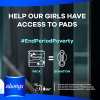
A few weeks ago we read an article about the longstanding, far reaching, but rarely discussed issue that millions of teenage girls (and women) face – Period Poverty. Period poverty is the inability to afford sanitary napkins.
A recent study shows that one in ten girls in Central America miss classes during their menstrual cycle because they lack proper sanitary protection. This ratio may be worse in Jamaica given the heightened financial challenges from the pandemic and rising fuel prices from the Ukraine conflict.
As with everything else, the price for sanitary napkins has risen in the past year and could get worse with the current world crises. The impact of this on secondary school girls from inner city communities is significant. It puts this critical personal item out of their reach and increases their experience of Period Poverty.
No doubt, many secondary school girls miss classes because they are victims of period poverty. The negative psychological impact on their self-esteem is incalculable, resonating beyond their teens years into womanhood and motherhood.
Several companies and Not-For-Profit (NFP) organisations are addressing this issue. They are running campaigns and activities so girls in secondary schools, places of safety and women’s shelters get sanitary napkins as a result of private and public donations.
Let’s wake up to this need and help alleviate a debilitating issue. Both women and men can support in-store promotions, donate through NFP’s such as service clubs, and most importantly, openly discuss an issue that still seems to be a taboo topic – especially having conversations with our own teenagers.
By making our children more informed, they become more sensitised to classmates who experience period poverty and will be more supportive when they see obvious signs and symptoms. Their knowledge can convert to sympathy and sympathy to kindness. Remember, ‘Sometimes it takes only one act of kindness and caring to change a person’s life’ Jackie Chan
We at Panmedia are proud to be currently involved in creating increased public awareness of this issue.
